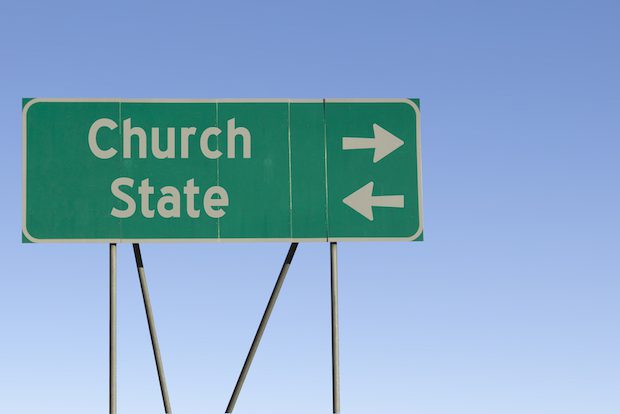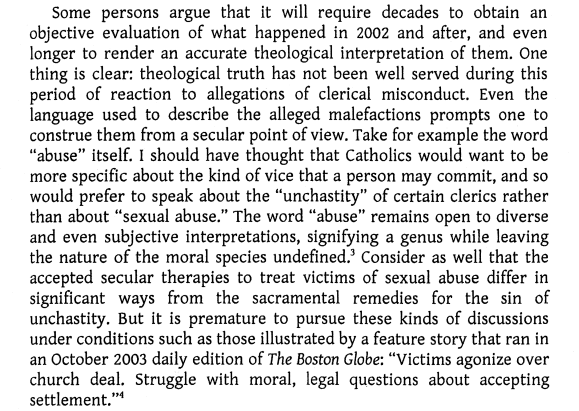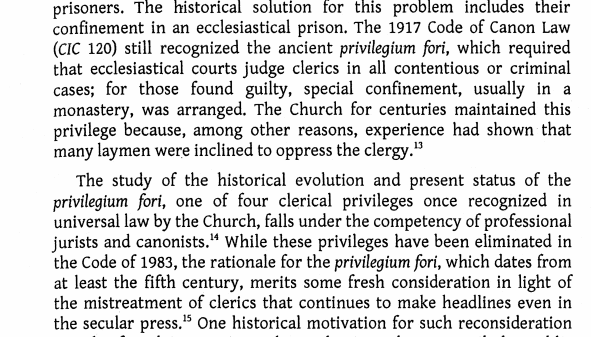Integralism, Liberalism, Or … What?

The First Things book review essay by Father Romanus Cessario in which the Dominican priest defends Pope Pius IX’s actions in the 1858 Edgardo Mortara case has stirred up a hornet’s nest. I wrote about it yesterday, and was quite critical of Father Cessario for his full-throated defense of Pius IX and the Church of that day. Cessario wrote:
In his case, divine Providence kindly arranged for his being introduced into a regular Christian life. Edgardo received instruction about the gift baptism imparted to him.
What he’s talking about is the Church permanently removing a Jewish boy who had been secretly baptized by the housemaid from his parents, so that he could be raised as the Catholic that he was by baptism. Cessario presents this atrocity as if it were a blessing from God.
Father Cessario, it appears, has a way with euphemism. In this lecture, he contends that the Church was victimized by the reporting of the sexual abuse scandal. Excerpt:

In other words, it’s more accurate to speak of priests raping and molesting children as “unchastity” as opposed to sexual abuse. This makes sense, I suppose, given that Cessario longs for the return of the old privilegium fori — the right the Catholic Church once held (not in the US) to exempt its priests from trial in secular courts, and instead grant them trial in ecclesiastical courts.

Read the entire paper here. If you depend on Father Cessario for your information about the John Geoghan case, you will not learn that Geoghan was a serial child molester who preyed on the children of the poor. You will not learn that the Archdiocese of Boston knew all about Geoghan’s crimes, and kept reassigning him to parish work. Geoghan and his molesting confrères were guilty only of “unchastity,” and poor Cardinal Law was hard done by the media. This is repulsive clericalist claptrap, but it does give you an idea of the mindset behind this particular defender of Pius IX’s sacred kidnapping of Edgardo Mortara.
I bring up Cessario’s paper in this Mortara discussion because both cases compel conservative Catholics (and sympathetic Christians in other churches, like me) to face squarely the serious issues emerging from the clash between liberalism and integralism. It is not so difficult for us to perceive the many problems with liberalism, from a traditional Christian point of view. But we need to think clearly about the proposed integralist solution to these problems, and whether it is a solution at all.
Integralism is the belief that a nation is one, and that there should be an integration of Church and State. The term was coined by the far-right French Catholic Charles Maurras to describe the reactionary response to 19th and early 20th century French anticlericalism. Here, from the pro-integralist website The Josias, is a short definition of integralism:
Catholic Integralism is a tradition of thought that rejects the liberal separation of politics from concern with the end of human life, holding that political rule must order man to his final goal. Since, however, man has both a temporal and an eternal end, integralism holds that there are two powers that rule him: a temporal power and a spiritual power. And since man’s temporal end is subordinated to his eternal end the temporal power must be subordinated to the spiritual power.
If you want to know more about Catholic integralism, The Josias is a good place to begin.
The Eastern Orthodox churches have an ancient history of the Church and the State being tied closely together. The social teaching document of the Russian Orthodox Church is really interesting in this regard. It calls for a separation of Church and State — or at least regards this as normative in modernity — but also calls for both to work together for the good of society. Notice this in III.7 (emphasis in the original):
Any change in the form of government to that more religiously rooted, introduced without spiritualising society itself, will inevitably degenerate into falsehood and hypocrisy and make this form weak and valueless in the eyes of the people. However, one cannot altogether exclude the possibility of such a spiritual revival of society as to make natural a religiously higher form of government. But under slavery one should follow St. Paul advice: «if thou mayest be free, use it rather» (1 Cor. 7:21). At the same time, the Church should give more attention not to the system of the outer organisation of state, but to the inner condition of her members’ hearts. Therefore, the Church does not believe it possible for her to become an initiator of any change in the form of government. Along the same line, the 1994 Bishops’ Council of the Russian Orthodox Church stressed the soundness of the attitude whereby «the Church does not give preference to any social system or any of the existing political doctrines».
The Russian model offers ways to think about the relationship between Church and State that are more harmonious (“symphonic” is the word the Russians use) without being integrated. Yet the Russians seem well aware that their model emerges out of their society’s own history, and that it is only really workable in a society that is predominantly Orthodox. A superficial reading of the document makes it easy to imagine that this model could work in predominantly Catholic countries, at least in theory. Perhaps it could be adapted to predominantly Christian countries. I would be quite interested to read Catholic and/or Orthodox scholars who have compared and contrasted Catholic integralism with the Russian Orthodox model. I am not sufficiently well informed about either to understand their similarities and their differences.
We have to remember, though, that it is quite unrealistic to expect anything like that to take root in the US or Europe any time soon. As the Russian document observes, without the re-spiritualization (reconversion) of society, a form of government that involves the Church to the degree proposed by the Orthodox is fraught with peril. But it’s also true that, as the document says, we can’t discount that a form of government that is more religiously favorable in nature could emerge from that re-spiritualization.
Regular readers know that I write often about the problems with liberalism, particularly its hegemonic overreach in its advocacy of emancipating the choosing individual. It is by no means a fantasy to imagine the liberal state removing children who consider themselves to be transgendered removing them from the homes of parents, Christian or otherwise, who deny that they are. Ontario last year passed a bill adding denial of gender identity and expression to its list of reasons why the state may remove a child from a family. Officials said Christian concerns that the government would seize trans kids from families on that basis alone are exaggerated.
I wouldn’t trust that at all. LGBT advocates are very quick to argue that unless you give transgender youth whatever they ask for, they are at suicide risk. If a government accepts that parents denying a child’s self-professed gender identity and expression is a valid reason for intervening to protect the child, and authorities accept the argument that a child living with unsupportive parents is a suicide risk, then why wouldn’t the state intervene?
Despite its pretenses, liberalism is not neutral (and if you doubt that, I urge you to read James Kalb’s brilliant book The Tyranny of Liberalism, the title of which makes it sound like a conservative talk radio screed, which it absolutely is not). Nevertheless, a consideration of the Mortara case, as well as reading Fr. Cessario’s meditations on the abuse scandal, ought to make it clear why liberalism is not to be dismissed tout court, even by conservative religious critics of liberalism.
Let me put it like this. I agree with those who say that Edgardo Mortara was, in a real (= not merely symbolic) sense, transformed into a Christian by his baptism. But it does not follow that it was therefore morally right to remove the Mortara boy from his Jewish family, against their will, to raise him in a religion he had not chosen, nor would his parents have chosen for him. Yes, there is a certain logical consistency in what the pope did, but on that same logic, wouldn’t it make sense for the Church to send squads out into the world to baptize non-Christian children for their own eternal good, then have the state seize those children from their parents so that they can receive the Catholic upbringing that their baptism mandates?
Nobody would advocate such a scheme, but if you accept the cold logic justifying the Mortara boy’s seizure — that it was good and necessary to save his soul — then on what grounds would you object? After all, can we really rest easy, knowing there are all those unbaptized children headed for Hell? (I don’t believe this, obviously; I’m proposing a thought experiment.)
In the real world that we live in — the post-Christian world — it seems to me imprudent for conservative American Christians, including Catholics, to give up so easily on liberalism, despite all its problems. Militant liberalism is turning into a secular version of Pius IX’s church. The First Amendment — an artifact of liberalism — is our greatest protection as an increasing (and increasingly despised) minority. It is not absolute protection, but what else do we have?
Besides which, even though I am a critic of liberalism, I do not want to live in a Christian state that reserves the right to seize children from their families for religious reasons, and that allows the clergy to be above the same law that governs all of us. Do you, my fellow conservative Christian?
This is the kind of thing I believe Patrick Deneen is talking about in his new book Why Liberalism Failed, when he says at the end that in looking forward to whatever comes next, we should not discount the good things that liberalism brought us. We are not going to return to the Papal States, nor should we wish to even if it were possible. Pluralism is a fact, at least in the United States. Absent the re-spiritualization of society — which is a primary goal of my Benedict Option — we traditional Christians are going to have to do our very best to retain the rights to live as we believe God calls us to live. I don’t see any practical prospect for this except by appealing to liberal ideas and categories.
But it’s also true, as Deneen demonstrates persuasively in his book, that liberalism is unsustainable. (See my interview with Deneen from yesterday for a sense of his argument.) In contemplating what will emerge from liberalism — a process that Deneen concedes will take a long, long time, and will be pretty messy — it would do us conservatives and traditionalists well to consider why liberalism emerged in the first place.
And it would do liberals and progressives well to confront the limitations of liberalism, and whether or not they want to turn into left-wing versions of Pius IX, and use the coercive power of government to enforce their idea of the Good, on the principle that “error has no rights”? After all, Pius IX’s denunciation of religious liberty came in the wake of revolutionary regimes in Europe, especially France, actively persecuting the Church and confiscating its churches and monasteries — all under the name of religious liberty. At what point would contemporary liberals be willing to grant conservative religious believers the right to live according to principles that liberals believe are wrong?
These are not abstract questions. Pope Francis has strong beliefs about the desirability of immigration to Europe. Would integralists really be at ease with European governments yielding public policy to the pope’s wishes on this point? Plus, at some point in the next few years, there will be a transgender Edgardo Mortara, and we will see secular liberals be as ardent as Pio Nono was. Yesterday on Twitter I brought this up, and a Catholic priest responded that the situations are not compatible, because Catholicism (and Catholic baptism) is true, and transgenderism is not. Yeah, well good luck with that argument in the American courts. Liberalism is deeply problematic, but I don’t see what realistic alternatives we have.
I welcome your input. Please stay focused on the topic. Any comments ranting about anti-Catholic bias, anti-trans bigotry, etc, will not be approved. Let’s have an intelligent discussion and disputation, shall we?
Subscribe for as little as $5/mo to start commenting on Rod’s blog.